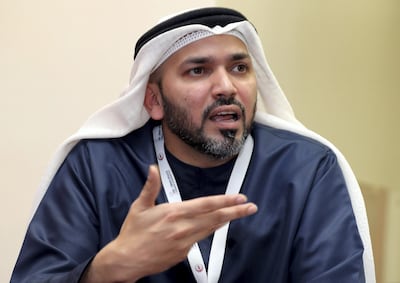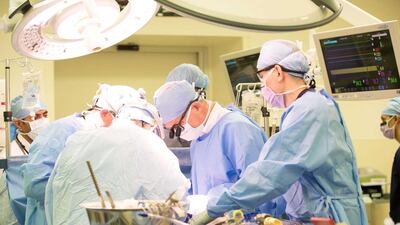The UAE's largest transplant centre is receiving calls "every day" from prospective donors, providing hope to hundreds of patients on a waiting list for new organs.
Doctors at Sheikh Khalifa Medical City (SKMC) said they have been encouraged by the number of members of the public that have come forward to volunteer to give their organs in the event of their death.
The hospital has conducted four kidney transplants from deceased donors to living patients since a change in the law last year made the procedure possible for the first time.
It also intends to branch out from just kidney operations this year.
But with 1,100 people currently on dialysis and 200 new patients every year in government hospitals, medics want to spread awareness and promote a culture of donating organs.
“There are many people with organ failure in this country, so our job is to promote transplantation and let people know that there are options available," said Dr Mohamed Al Seiari, consultant physician and a nephrologist at SKMC.
“To my surprise though, there are many families who want to donate. Every day we receive calls from people who want to donate after their death. There is an evident change in culture, but we still need further education and to spread the word.”

He gave an example of the Emirati parents of a four-year-old boy who died recently.
“Their son was just declared dead and they immediately told us to take his organs. They said that they didn’t want to go feeling that their son’s life has gone to waste. They literally fought with us to take their son’s organs after he was declared dead at the hospital."
But the recent change means tha tthe UAE is starting a donor programme from scratch.
The deceased donor list is open to nationals and non UAE nationals in the UAE.
However, talks are still going on about the mechanism and how and where people can register to be donors.
Current procedures include hospital staff visiting emergency units and approaching families of eligible donors.
“As times passes and the registry develops, people will understand this concept more and be more than willing to donate," said Dr Mohammed Badar Zaman, head of transplant and liver Surgery at SKMC.
"In the meantime, the way that it happens is that when someone dies in a hospital, and is confirmed dead, then someone approaches the family to ask for consent."
He said there is a need to create a larger pool of potential donors.
“Every year 200 new patients are added to that list, so the number of patients who need to be transplanted in this country is quite high," he said.
_____________
Read more:
Everything you need to know about the UAE's organ donor transplant programme
Boy gets new lease on life after successful kidney transplant in Abu Dhabi
Editorial: Clarity needed on donor laws
_____________
He said the waiting list for organs reflects the general population, most are expats.
“It is well distributed amongst all nationalities but what we have noticed is that in the past couple of years, there has been a steady rise of Emiratis coming forward for transplantation," he said.
Dr Mohammed Badar Zaman said a system will soon allow people to identify themselves as a donor, though it is not known if that will involve carrying a card, for example, as in some countries.
“The message is that soon the Department of Health will set up a registry, so national policies and procedures can be set out out," he said.
"We have actively started the programme at SKMC for anyone who needs a transplant and does not have a living related donor.
"Anyone who wishes to register or needs a transplant can do so without discrimination. Anyone who wishes to donate their organs can contact us directly.
“Transplants are for anyone and everybody who is living in the UAE - whether a UAE national or not."

